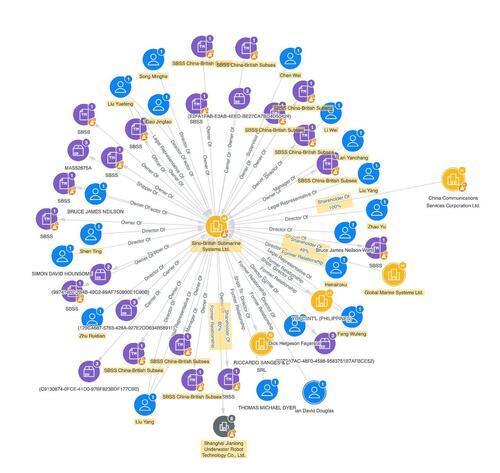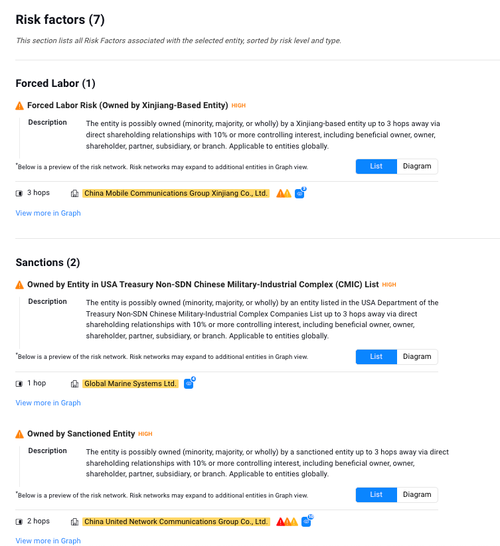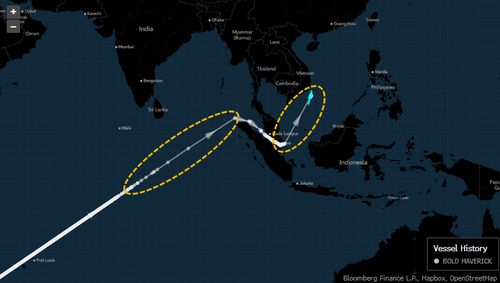
State Department officials told a team of Wall Street Journal reporters about the increasing risks that undersea telecommunications cables could be susceptible to espionage.
The officials became concerned when a state-controlled Chinese firm that repairs undersea cables, SB Submarine Systems, unexplainably and repeatedly concealed the location data of its ship from radio and satellite tracking services. They said the ship's concealment of its position "defied easy explanation."
The warnings about potential espionage or even sabotage of undersea cables come nearly three months after underwater telecommunications cables linking Europe and Asia were "damaged" in the Red Sea between Jeddah in Saudi Arabia and Djibouti in East Africa.
We were the first to report a mysterious Iranian spy ship was operating near the incident area. At the time, David Asher, a senior fellow at Hudson Institute, said, "The Qods Force is operating a spy ship called the 'Behsad' that is reportedly in the Gulf of Aden, not far from where the undersea cables were cut. This ship highly likely carries a Qods Force special underwater warfare force component more than capable of carrying out an undersea cable attack."
A US defense official recently warned Silicon Valley giants such as Google and Meta Platforms about the mounting risks the Chinese could threaten US-owned cables:
US officials have told companies, including Google and Meta, about their concerns that Chinese companies could threaten the security of US-owned cables, a person familiar with the briefings said. In some cases, the conversations have included discussion of Shanghai-based SB Submarine Systems, the person said. -WSJ
WSJ provided more color on the Chinese maintenance firm that repairs broken internet lines:
Senior Biden administration officials have also received briefings in recent months about the risks posed by Chinese companies, including SBSS, working on repairs to undersea cables, according to the person.
The security of undersea cables "is rooted in the ability of trusted entities to build, maintain, and repair" them "in a transparent and safe manner," the National Security Council said in a statement, noting that satellite ship tracking "is one such measure that supports vessel monitoring and safety."
Digging deeper into SBSS, data from Sayari, a top counterparty and supply chain risk intelligence provider, shows a web of connections the company has, including several major risk factors.
One of those risk factors includes "possibly owned (minority, majority, or wholly) by" Global Marine Systems Ltd., which is "listed in the USA Department of the Treasury Non-SDN Chinese Military-Industrial Complex Companies," Sayari says on its online platform.
Sayari data shows SBSS is "possibly owned (minority, majority, or wholly) by a sanctioned entity up to 3 hops away via direct shareholding relationships with 10% or more controlling interest" by China United Network Communications Group Co.
One of the ships in question is called "Bold Maverick," and it has periodically turned on and off its transponder data near areas with undersea cables, which continues to worry US defense officials.
"The data gaps were unusual for commercial cable ships and lacked clear explanation," the officials said.
Defense officials and big tech firms are increasingly concerned about companies like SBSS tapping or even severing undersea cables.
The Red Sea cable severing incident earlier this year was the most recent wake-up call about these emerging national security risks.
State Department officials told a team of Wall Street Journal reporters about the increasing risks that undersea telecommunications cables could be susceptible to espionage.
The officials became concerned when a state-controlled Chinese firm that repairs undersea cables, SB Submarine Systems, unexplainably and repeatedly concealed the location data of its ship from radio and satellite tracking services. They said the ship’s concealment of its position “defied easy explanation.”
The warnings about potential espionage or even sabotage of undersea cables come nearly three months after underwater telecommunications cables linking Europe and Asia were “damaged” in the Red Sea between Jeddah in Saudi Arabia and Djibouti in East Africa.
We were the first to report a mysterious Iranian spy ship was operating near the incident area. At the time, David Asher, a senior fellow at Hudson Institute, said, “The Qods Force is operating a spy ship called the ‘Behsad’ that is reportedly in the Gulf of Aden, not far from where the undersea cables were cut. This ship highly likely carries a Qods Force special underwater warfare force component more than capable of carrying out an undersea cable attack.”
A US defense official recently warned Silicon Valley giants such as Google and Meta Platforms about the mounting risks the Chinese could threaten US-owned cables:
US officials have told companies, including Google and Meta, about their concerns that Chinese companies could threaten the security of US-owned cables, a person familiar with the briefings said. In some cases, the conversations have included discussion of Shanghai-based SB Submarine Systems, the person said. -WSJ
WSJ provided more color on the Chinese maintenance firm that repairs broken internet lines:
Senior Biden administration officials have also received briefings in recent months about the risks posed by Chinese companies, including SBSS, working on repairs to undersea cables, according to the person.
The security of undersea cables “is rooted in the ability of trusted entities to build, maintain, and repair” them “in a transparent and safe manner,” the National Security Council said in a statement, noting that satellite ship tracking “is one such measure that supports vessel monitoring and safety.”
Digging deeper into SBSS, data from Sayari, a top counterparty and supply chain risk intelligence provider, shows a web of connections the company has, including several major risk factors.
One of those risk factors includes “possibly owned (minority, majority, or wholly) by” Global Marine Systems Ltd., which is “listed in the USA Department of the Treasury Non-SDN Chinese Military-Industrial Complex Companies,” Sayari says on its online platform.
Sayari data shows SBSS is “possibly owned (minority, majority, or wholly) by a sanctioned entity up to 3 hops away via direct shareholding relationships with 10% or more controlling interest” by China United Network Communications Group Co.
One of the ships in question is called “Bold Maverick,” and it has periodically turned on and off its transponder data near areas with undersea cables, which continues to worry US defense officials.
“The data gaps were unusual for commercial cable ships and lacked clear explanation,” the officials said.
Defense officials and big tech firms are increasingly concerned about companies like SBSS tapping or even severing undersea cables.
The Red Sea cable severing incident earlier this year was the most recent wake-up call about these emerging national security risks.
Loading…







